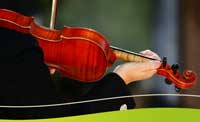
  Violin One on One  Violin One on One
  Parent's Guide to Music Lessons  Parent's Guide to Music Lessons
 Guide to Great Music Practice Guide to Great Music Practice
  Music Know how  Music Know how
|
 |
|
|
What is the best way to avoid being nervous at a jury or an audition?
What is the best way to avoid being nervous at a jury or an audition?
- Prepare the music carefully, leaving nothing to chance. Everything should be so well prepared, you can play it cold, no matter what.
This requires you to divide your practice up into "preparing time" and "performing time," a concept Galamian talks about in Principles of Violin Playing and Teaching.
- You should make an effort to tend to your health--that is, have had enough sleep, eat potassium rich foods like bananas, don't eat meat, fried foods or dairy (vegan is best, but at least avoid heavy foods), and exercise.
But don't hurt your hands!
I recommend walking, lifting light weights (I have a pair of 4 lb. Chinese barbells which I use regularly, lots of reps) and do yoga and stretching.
Swimming is also good.
Bicycling is good, but you can hurt your hands if you don't do it right, so be careful. Lots of fresh air and sunshine and positive thoughts.
- Be philosophical. Why do we study music? To make a big deal out of ourselves? No. If anyone does art to aggrandize themselves, they're doomed from the beginning.
We do art to be in contact with the best human minds, to make beauty, and to express the best in humanity. We do it out of love. We do it because we can't do anything else. Given all that, so what if you aren't perfect? Only god is perfect. Do your best, give it everything you've got, and then make music and enjoy yourself. That's what counts. Forget yourself.
- Remember the little things which the listeners are going to be looking for (particularly if one of your listeners is a conductor), and which will indicate if your training is solid.
These include stylistic accuracy, rhythmic integrity, attention to phrasing and dynamics, good intonation, and musical sensibility. Bach is different than Brahms. Dynamics don't just happen, you have to make them happen. Everything in the score is there for a reason. Plan the bowings and phrasing ahead of time (though some leeway is allowed for interpretive inspiration of the moment).
This is all very hard work and time consuming, but don't blow any of it off and expect it to happen automatically when you go in to play. It won't.
Also see the following:
- Stage Fright in Music Performance and Its Relationship to the Unconscious, Michael I. Goode
- Audition Success: An Olympic Sports Psychologist Teaches Performing Artists How to Win, Don Greene
- ˘ Complete Guide to Pilates, Yoga, and Meditation
- ˘ Mastery: The Keys to Success and Long-Term Fulfillment, George Leonard
- ˘ Mental Toughness Training for Sports, James Loehr, Ed.D.
- ˘ The Inner Game of Music, Barry Green.
- ˘ Zen in the Art of Archery, Eugene Herrigel.
- ˘ The Alexander Technique Workbook, Richard Brennan.
Connie Sunday: Freelance studio musician, strings and piano teacher, author of Violin FAQ and numerous essays in violin pedagogy. Further information can be found at connexions.
|
|
|
|
|
|
|
|

